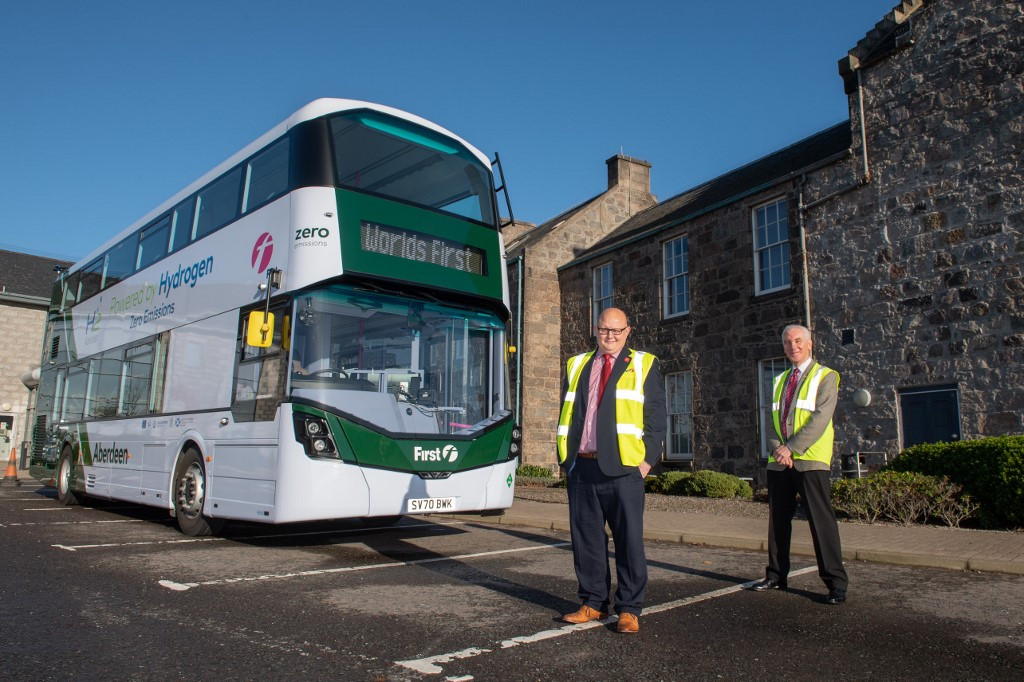Catching the number 1: Aberdeen trials hydrogen buses
The Scottish city of Aberdeen is preparing to launch a fleet of the world's first hydrogen-powered double-decker buses, as it tries to reduce air pollution and transform itself into a green economy.
Change Size
 Operations Director for First Aberdeen, David Phillips (left) and Councillor Philip Bell pose alongside a world first hydrogen powered, zero emission double-decker bus in Ellon in Aberdeenshire, Scotland on November 5, 2020. (AFP/Michal Wachucik)
Operations Director for First Aberdeen, David Phillips (left) and Councillor Philip Bell pose alongside a world first hydrogen powered, zero emission double-decker bus in Ellon in Aberdeenshire, Scotland on November 5, 2020. (AFP/Michal Wachucik)
T
he Scottish city of Aberdeen enjoyed a boom after the discovery of oil in the North Sea in the 1960s, propelling it to a central role in the industry.
Now it's preparing to launch a fleet of the world's first hydrogen-powered double-decker buses, as it tries to reduce air pollution and transform itself into a green economy.
The 15 vehicles emit water vapor instead of carbon monoxide and are in the final stages of testing before being put into service on the city's most popular routes.
The buses will use an existing hydrogen production and refueling station that was opened in 2015 to fill up with the universe's most abundant element.
"At the moment Aberdeen produces 500 kilograms of green hydrogen every day," said Philip Bell, Aberdeen City Council's hydrogen spokesman.
"Our plan is to have a hydrogen hub in three years that will produce three and a half tons of the gas a day," he told AFP.
The green and white-liveried buses, built by the Wrightbus company in Northern Ireland, cost £500,000 ($658,000, 555,000 euros) each.
They complement Aberdeen's existing fleet of hydrogen- and electric-powered council vans and road sweepers, said Bell.
The city hopes the £8.3-million project, part-funded by the Scottish Government and the European Union, will help to develop a hydrogen industry in the region as demand grows.
Hydrogen technology has been present for several years but demand for the gas has grown more than threefold since 1975, according to the International Energy Agency.
The gas can be produced through electrolysis, which involves running an electrical current through water to split it into hydrogen and oxygen, cutting carbon emissions.
But development of the infrastructure needed is slow, holding back widespread adoption of the technology.
Projects using hydrogen technology have increased in frequency as companies and governments seek to reduce carbon emissions and air pollution, particularly from road transport.
Read also: Germany rolls out world's first hydrogen train
Efficiency and refueling
The world's first hydrogen-powered bus rapid transit system was deployed in the city of Pau, in southwest France, in 2019.
The system, dubbed Febus, uses 18-meter-long Van Hool buses on a dedicated six-kilometer line in the center of the city.
Scotland is currently testing the world's first hydrogen-fueled ferry at the European Marine Energy Centre on the island of Orkney, off the country's far northeast coast.
A hydrogen-powered train is also being tested in England, with the aim of carrying passengers by the end of next year.
In the UK, hydrogen fuel costs between £10 and £15 per kilogram, with prices varying depending on the availability of refueling stations.
According to Wrightbus, the hydrogen-powered double-deckers can be maintained and refilled for the same cost as a diesel bus.
David Phillips, operations director for First Aberdeen bus company, said the vehicles are as efficient as their electric equivalents, and refueling takes less than 10 minutes.
They are also quieter and provide smoother acceleration than conventional buses, he added.
"It's a chance to look at transport generally around how we can encourage a model shift," he said.
"The important thing with the project is that we need to understand the reliability and performance of these vehicles."









